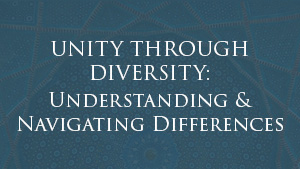Unity through Diversity (Understanding and Navigating Differences)
In this online course, spread over many weeks, we aim to study and have a thorough understanding of how and why differences occurred – and they continue to occur – in our Umma. Why are there apparently so many differences within the Umma? Are there differences in secondary matters of Aqida? How and why did the Companions disagree on certain matters? If the imams of the four Schools of Islamic law and classical jurists (fuqaha) established all their rulings from the Qur’an and Sunna, why do they differ on so many points? What are the conceptual/methodological (usuli) causes behind the different positions of the four Schools? How do the Qur’an and Hadith/Sunna influence and affect these differences? What were the different methods used by classical jurists in understanding/contextualizing a Hadith? Is acting upon a Hadith conditional upon its authenticity? Is it always wrong to act upon a weak Hadith? How do we approach these differences? Who do we ask and trust when different people say different things? When is it acceptable for Muslims to differ over religious matters? What are the etiquettes of differing? These and many other questions will be answered in this course, In Sha Allah.
Who should attend this course: Anyone who intends to have a thorough and balanced understanding of issues that divide the umma, and wants to feel at ease.

Course Includes:
- 25+ Hours of Teaching Pre-Recorded Session
-
LIVE Q&A Session:
18th Aug, 11 AM - 1 PM (UK) - Detailed course notes
- Google Classroom as Learning Portal
£30
About this Course
Course Description
- • The difference between definitive and secondary/speculative aspects of Aqida
- • How to deal with issues of disagreement between the Umma
- • The basics of Usul al-Fiqh
- • The basics of Usul al-Hadith (sahih/hasan/da’if, etc.)
- • Reasons for apparent contradictions in Prophetic narrations
- • How Qur’anic verses and Hadiths are understood differently
- • The main reasons and causes behind the differences
- • Case studies
- • The ethics of disagreement
- • And much more…
Course Details
In this online course, spread over many weeks, we aim to study and have a thorough understanding of how and why differences occurred – and they continue to occur – in our Umma. Why are there apparently so many differences within the Umma? Are there differences in secondary matters of Aqida? How and why did the Companions disagree on certain matters? If the imams of the four Schools of Islamic law and classical jurists (fuqaha) established all their rulings from the Qur’an and Sunna, why do they differ on so many points? What are the conceptual/methodological (usuli) causes behind the different positions of the four Schools? How do the Qur’an and Hadith/Sunna influence and affect these differences? What were the different methods used by classical jurists in understanding/contextualizing a Hadith? Is acting upon a Hadith conditional upon its authenticity? Is it always wrong to act upon a weak Hadith? How do we approach these differences? Who do we ask and trust when different people say different things? When is it acceptable for Muslims to differ over religious matters? What are the etiquettes of differing? These and many other questions will be answered in this course, In Sha Allah.
The course will be based on several key classical texts such as the works of Usul al-Fiqh and Usul al-Hadith, as well as modern works such as Shaykh Muhammad Awwama’s Athar al-Hadith al-Sharif fi Ikhtilaf al-A’imma al-Fuqaha’ (The Influence of the Noble Ḥadīth upon the Differences of Opinion amongst the Jurist Imāms), and Shaykh al-Hadith Muhammad Zakariya al-Kandahlawi’s Ikhtilaf A’imma (The Differences of the Imams). Each issue will be carefully scrutinized and dealt with in considerable detail, using many examples and case studies. Detailed course notes will also be provided, In Sha Allah. This course provides a unique opportunity to study the finer and detailed aspects of our faith, and summarized understanding of various sciences.
Learning Outcome:
- • The difference between definitive and secondary/speculative aspects of Aqida
- • How to deal with issues of disagreement between the Umma
- • The basics of Usul al-Fiqh
- • The basics of Usul al-Hadith (sahih/hasan/da’if, etc.)
- • Reasons for apparent contradictions in Prophetic narrations
- • How Qur’anic verses and Hadiths are understood differently
- • The main reasons and causes behind the differences
- • Case studies
- • The ethics of disagreement
- • And much more…
Discussion breakdown
- • Differences of opinion: A religious requirement and a source of mercy.
- • Difference between fundamental/definitive and secondary/speculative aspects of Aqida (Creed).
- • 10 reasons for the apparent contradictions within Prophetic narrations (hadiths), with examples.
- • Differences of opinion between the Companions.
- • Reasons for the differences of opinion between classical jurists (fuqaha) and mujtahid imams.
- • Differences in methodology and approach (usul al-fiqh) – seven principles with examples.
- • The role of the Sunna/Hadith in contributing to the differences: Causes 1 and 2, with examples.
- • Hadith terminologies such as Sahih, Hasan, Da’if.
- • Principles of Hadith verification (usul al-hadith).
- • The role of the Sunna/Hadith in contributing to the differences: Causes 3, 4 and 5, with examples.
- • The role of the Sunna/Hadith in contributing to the differences: Causes 6, 7 and 8, with examples.
- • Clarifying some misconceptions and oft-raised objections:
- – Possibility of earlier imams missing hadiths
- – Hadiths are more accessible in later generations
- – Weak narrations in classical fiqh works
- • Ijtihad (independent reasoning) and its pre-requisites.
- • Three case studies:
- • A woman marrying without the consent of her legal guardian (wali)
- • Charging a fee for cupping (hijama)
- • Performing the prayer of greeting (tahiyyat al-masjid) during the Friday khutba
- • Ethics of disagreement (adab al-ikhtilaf).
Course Instructor

Mufti Muhammad ibn Adam al-Kawthari
Shaykh Mufti Muhammad ibn Adam al-Kawthari is a traditionally-trained Islamic scholar who has studied the Arabic language and various other traditional Islamic sciences including Qur’anic exegesis (tafsir), Hadith and Fiqh in different parts of the world including the UK, Pakistan and Syria.
The Shaykh has taught many courses and lectured extensively on a range of topics, and continues to travel regularly teaching and lecturing both in the UK and abroad. Presently, he resides in Leicester, UK. He is a teacher of various traditional Islamic sciences, and Director and researcher at the Institute of Islamic Jurisprudence (Darul Iftaa, www.daruliftaa.com).
FAQs
We are using Google Classroom as our Learning Management Portal. Please sign-up to Google Classroom with same email address you will use during course enrolment. We will invite you to our course classroom.
Schedule for the classes is mentioned above under “Discussion and Breakdown” section.
You will be provided a recording of the session so you can catch up without missing any content.
We will be using Zoom.us. We will share zoom invite link with you on Google Classroom.
Yes. At the end of each day there will be long Q&A Session with Mufti Muhammad Ibn Adam.
